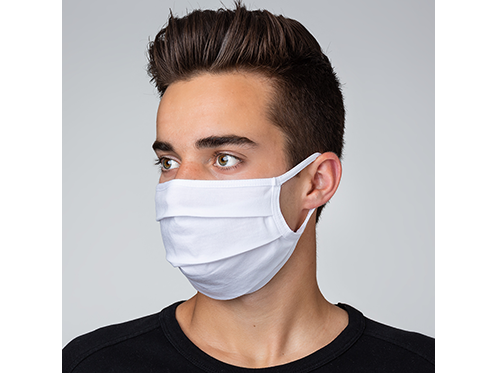Masks for everyday applications
Employees with personal contact and private users
Textile Masks
Textile masks for external protection are available in 1-, 2- or 3-layers. More layers mean better filtering properties, but may make breathing more difficult. These masks are not subject to EN standards and are not suitable for the medical/nursing sector. This is neither a medical product nor personal protective equipment.
Self-produced makeshift masks made of commercially available materials for private use in everyday life are not considered a medical product or part of personal protective equipment. They may not replace professional masks in places where they are mandatory.

W6099800027_p
Mouth-and-nose-masks (MNM)
Mouth-and-nose-masks (MNM), which are optically similar to the surgical mask, serve to protect against foreign bodies. This mask is not subject to EN standards and is therefore not suitable for the medical/nursing sector. Despite the lack of suitability for the medical and care sector, credible testing and certification of this mask type is a clear sign of quality. The Keller & Kalmbach mouth-and-nose-mask is 3-layer, has a filter performance of 92% and was tested by a certified institute. However, it is neither a medical product nor personal protective equipment.
For comparison: The medical mouth-nose mask type I according to EN 14683:2019 has a filter performance of 95%.
Although corresponding MNM mouth-and-nose-masks also protect the wearer of the mask when firmly in place, this is not the primary purpose of MNM. Since, depending on the fit of the MNM, the wearer essentially does not inhale through the fleece of the MNM, but the air is drawn in past the edges of the MNM, MNM generally offer the wearer little protection against pathogen-containing droplets and aerosols. However, they can protect the mouth and nose area of the wearer from direct contact with larger droplets from the other person and from the transmission of pathogens through direct contact with the hands.

W6099800026
Federal Institute for Drugs and Medical Devices (BfArM)
For further information on the handling of "community masks" we recommend the Federal Institute for Drugs and Medical Devices (BfArM).
Robert Koch Institute (RKI)
For further information on the use of masks (MNS, FFP and temporary masks), we recommend the Robert Koch Institute (RKI).









